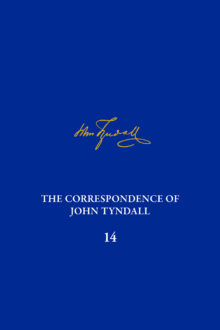
Matthew Stanley
Matthew Stanley is a professor at the Gallatin School of Individualized Study at New York University. He is the author of Einstein’s War: How Relativity Triumphed amid the Vicious Nationalism of World War I, Practical Mystic: Religion, Science, and A. S. Eddington, and Huxley’s Church and Maxwell’s Demon.
The Correspondence of John Tyndall, Volume 14
The Correspondence, October 1873–October 1875
The 499 letters in the fourteenth volume of The Correspondence of John Tyndall cover a number of particularly intense and acrimonious disputes. More notably, this volume spans the period of the composition, delivery, and furious reaction to Tyndall’s famous—or, more accurately, infamous—Belfast Address. This prestigious lecture, which he delivered as the newly inaugurated president of the British Association for the Advancement of Science, has long been heralded as one of the most momentous events of the nineteenth century. The letters in this volume provide a new, and unprecedentedly detailed, account of all aspects of the era-defining address. For Tyndall himself, it afforded a new level of prominence as a public intellectual, and he deployed his position to engage directly with some of the most contentious issues in Victorian society, especially the role of religion in relation to science. But Tyndall’s expertise was also required on more practical matters, and the letters in this volume document his extensive role in determining official government policy on urgent questions such as safety at sea and public health. Additionally, they chart a dramatic shift in his personal life, with his initial correspondence with Louisa Hamilton, with whom he had previously communicated only through her family, marking the point where their burgeoning friendship developed into a formal relationship.

